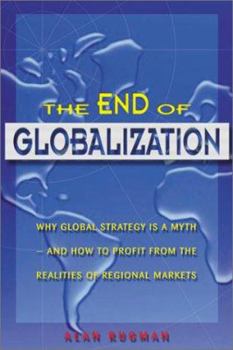The End of Globalization: Why Global Strategy Is a Myth & How to Profit from the Realities of Regional Markets
In a radical departure from traditional thinking, Alan Rugman proclaims globalization a myth. The reality, he says, is that business is almost entirely regional, with multinational firms aggressively... This description may be from another edition of this product.
Format:Hardcover
Language:English
ISBN:0814406386
ISBN13:9780814406380
Release Date:January 2001
Publisher:Amacom
Length:256 Pages
Weight:0.05 lbs.
Dimensions:0.9" x 6.3" x 9.4"
Customer Reviews
3 ratings
Globalization---Myths and Realities
Published by Thriftbooks.com User , 22 years ago
Alan Rugman does yeoman service in dispelling the myths of globalization as an omnipotent and omnipresent force in international business. Drawing on a myriad of recent cases, such as Disney and Saatchi and Saatchi, Rugman presents a thorough, compelling and provocative argument that regional markets and intra-firm transactions and relationships within those markets (particularly the triad of Asia, North America and Europe) and not a globalized, cast-the-net-widely juggernaut approach to multinational corporate strategy will continue to rule the day.
An Excellent Read
Published by Thriftbooks.com User , 23 years ago
Alan Rugman is one of the top business school researchers in the world. In this insightful book he takes a different view of globalisation than most. It is very useful and thougt provoking.
Brilliant Injection of Realism into Fog of Controversy
Published by Thriftbooks.com User , 23 years ago
Rugman's "End of Globalization..." is a superb analysis of the international trade of product and services and the nature of foreign investment. He effectively shows how, in reality, international trade and investment needs to be understood in terms of firm and not market activity, and in particular, in terms of the activities of 441 of the Fortune 500 companies. Rugman's work shows how most globalization activity is, in fact, based within a triad of Europe, Japan and the U.S., Foreign Direct Investment is largely intra-firm and industry, and that the key driver is regional and local based economic activity, not a global free-for-all. Rugman provides examples of how globalization fails (Disney, Saatchi and Saatchi) as well as success stories (ACER) and an analysis of how 20 of the world's multi-national corporations actually operate - i.e., with a strong regional and local presence.We covers the role of the WTO (demise imminent), protectionism (NAFTA and EU), health and evironmental restrictions, and positions the dot com dream of internet-driven wealth as being one of media hype. There is no single global culture he says, and the new mantra really should be "Think Regional. Act Local. Forget Global".This book is a brilliant demolition act on the false promises of globalization and also a stinging riposte to the doom-mongering paranoia of the Starbuck's trashers of Seattle and the McLibel crybabies. Well written, clear, forthright, and with relevant examples this book is a must for students of globalization and international economics everywhere





